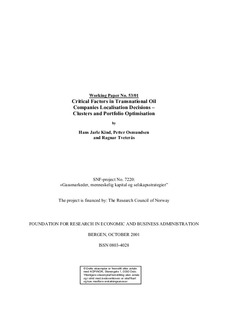| dc.contributor.author | Kind, Hans Jarle | |
| dc.contributor.author | Osmundsen, Petter | |
| dc.contributor.author | Tveterås, Ragnar | |
| dc.date.accessioned | 2006-07-20T11:08:58Z | |
| dc.date.available | 2006-07-20T11:08:58Z | |
| dc.date.issued | 2001-10 | |
| dc.identifier.issn | 0803-4028 | |
| dc.identifier.uri | http://hdl.handle.net/11250/166564 | |
| dc.description.abstract | Enhanced understanding of the factors determining transnational companies’ localisation decisions is important for regulators and other stakeholders concerned about maintaining current activity levels in a petroleum producing country. This article discusses localisation decisions in the context of theories of industrial clusters and real portfolio optimisation theory (materiality), which we argue are two fruitful lines of explanation for transnational companies’ behaviour. The industrial cluster literature is concerned about the level of positive externalities associated with geographic clustering of related production activities. The concept of materiality, implying that investment projects in an oil province must be of a certain minimum size in order to be interesting for oil companies, is evaluated empirically and compared to predictions of mainstream economic theory. | en |
| dc.format.extent | 135416 bytes | |
| dc.format.mimetype | application/pdf | |
| dc.language.iso | eng | en |
| dc.publisher | SNF | en |
| dc.relation.ispartofseries | Working Paper | en |
| dc.relation.ispartofseries | 2001:53 | en |
| dc.title | Critical factors in transnational oil companies localisation decisions : clusters and portfolio optimisation | en |
| dc.type | Working paper | en |
